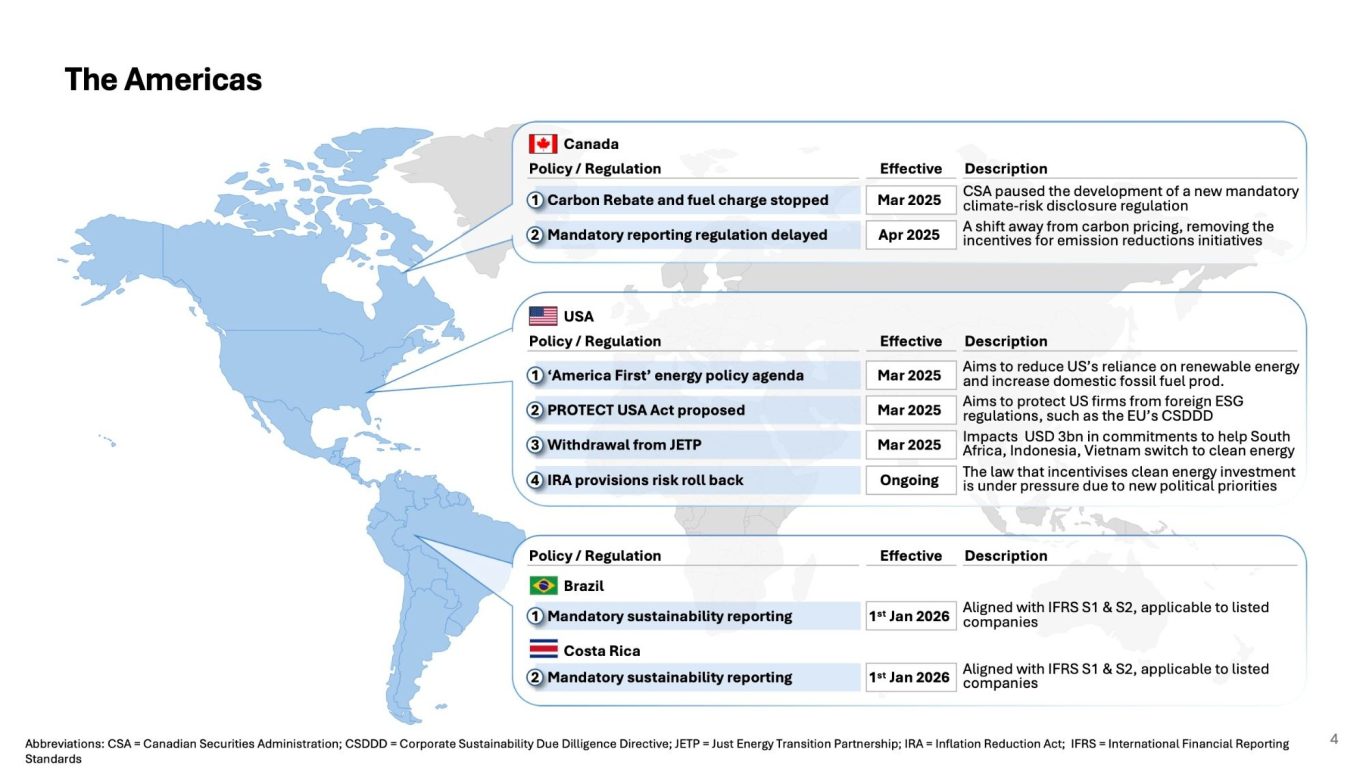
Sustainability in 2025: Less talk, more action?
16th May 2025
Author: Diana Calmic
Sustainability is seeing tectonic changes in 2025, underlined by diverging policies on renewable energy, converging regulation on reporting requirements, and the heightened urgency to accelerate sustainability initiatives.
To make strategic decisions in this rapidly evolving landscape, leaders need to take an eagle’s eye view – to understand underlying trends and identify challenges and opportunities in the sustainability space across the world.
As such, this article aim to presents a map of the key sustainability regulations and policy developments in each region of the world in 2025, the dates these regulations come into effect, and the companies that must comply to them.
To make sure I present the latest data and cover as much ground as possible, I limited my analysis to one week and use generative AI for data collection and aggregation as a basis for my analysis.
Using Open AI’s ChatGPT 4 Deep Search and Google’s Gemini Deep Search, I sifted through 254 sources in less than 10min, quoted 15 more sources from further analysis and validation of the AI results. This totalled 269 sources covered in one week, ranging from industry reports to government press releases.
Next, I conducted a further analysis on the key sustainability regulation updates outside of the AI response, to identify further developments the AI might have missed. What I discovered were even more news and developments on top of the 269 sources – nuances in clean tech developments, political agendas, and achievements in sustainable finance.
However, the endeavour to know everything there is to know about sustainability is one that can easily become endless. Therefore, on this occasion, I limited my analysis to the scope and the timeframe described.
Thus, combining machine functionality with human skill, I distil the findings on a series of maps below for clarity and accessibility to a business audience.
Three key themes stood out throughout the sustainability discussion in 2025
01
Policy makers are actively prioritising energy
Whether it is a focus on energy security, pursued by countries like the US, or energy transition, pursued by countries like the UK, the EU, and certain players in the APAC region and beyond, policy efforts are strengthening to bolster the energy sector.
02
Mandatory sustainability reporting standards are becoming the new norm
More and more countries are making sustainability reporting mandatory, aligning their standards with international frameworks like ISSB and GRI to improve interoperability and minimise the administrative burden on reporting companies
03
Corporations are taking proactive actions despite uncertainties
Throughout the world, corporations are channelling their resources and strategy towards more transparent and efficient ESG reporting and expanding their investment in sustainability projects
The Americas
Generally, ESG regulation is currently being deprioritised in the US and Canada. The Trump administration is proposing the expansion of fossil fuel energy sources to ensure energy security, as well as aiming to deprioritise sustainability initiatives and funds, such as the Inflation Reduction Act. Canada is rolling back their carbon rebate system, and has slowed their effort in developing the mandatory reporting regulation.
In South America, there is a common goal to align the national sustainability reporting standards to ISSB IFRS S1 and S2 sustainability disclosure standards, which is part of the strategic agendas for many countries in the region.

Europe and the UK
In Europe is seeing a heightened activity in sustainability regulation. The most significant is the proposed Omnibus package the ‘stop-the-clock’ directive that will reshape the comprehensive CSRD and CSDDD reporting requirements in the months to come. Most of the companies trading with the EU will likely be impacted by the CSRD and CSDDD changes.
The UK is developing a similarly robust sustainability disclosure standards, namely the SDR and SDS, as well as updating the Carbon Border Adjustment Mechanism to reach better alignment with the UK Emissions Trading Scheme.


Middle East and APAC
In the Middle East, Jordan’s mandatory standards are the first in the region to be adopted, whilst Abu Dhabi is leveraging the latest technology and released advanced ESG tools to sustainability tracking and improvements.
Overall, more and more companies in APAC are adopting mandatory sustainability reporting standards, develop incentives to bolster renewable energy investments, as well as pursue strategies to attract sustainability-linked investment from foreign investors.


In the private sphere, corporations are advancing their sustainability initiatives despite the geopolitical uncertainties. Achievements range from companies issuing millions of USD in blue bonds to finance water-related projects in the finance sector, rolling out automated packages across continents in the distribution sector, and developing new biodegradable materials in the fashion industry. Further case studies on sustainability solutions from the private sector will be presented in subsequent articles, focusing on the latest uses of AI.
If you enjoyed this article, you will love further articles at the intersection of AI and sustainability.
Disclaimer: This analysis used the free AI tools from Open AI and Google to find the latest news and updates on sustainability regulation and policy from across the world since Jan 2025, using open sources across the web. This article is not financial advice and should not be treated as such. Opinions expressed here are my own.
More to come!
Subscribe to our newsletter to get the latest insights straight to your inbox.
©Copyright. All rights reserved.
We need your consent to load the translations
We use a third-party service to translate the website content that may collect data about your activity. Please review the details in the privacy policy and accept the service to view the translations.